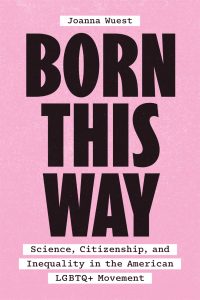Read an Excerpt from “Born This Way: Science, Citizenship, and Inequality in the American LGBTQ+ Movement” by Joanna Wuest
As we reach the halfway point of June, Pride Month festivities are in full swing. Across the country, activists are taking to the streets in protest, parades are marching in celebration, and rainbow logos are plastered on every purchasable item imaginable. Yet Pride Month 2023 is marred by the shadow of resurgent debates and restrictions on LGBTQ+ rights.
In the wake of restricted access to gender-affirming care, bans on drag shows, and the withholding of public funding for school tolerance programs, the Human Rights Campaign has declared a national state of emergency for LGBTQ+ people in response to mounting anxiety concerning physical safety and legal protections. Joanna Wuest’s Born This Way tells the story of how science became foundational to American queer political and legal advocacy. Read on for an excerpt from the Introduction.
In 2021 during the sweltering heat of the hottest Pride Month on record—or any June in the contiguous United States for that matter—Lady Gaga com-memorated the ten-year anniversary of her electro-pop sensation Born This Way. That album, rife with references to DNA and predestiny, actually borrowed its name from a disco-era gay liberation anthem titled “I Was Born This Way.” The record’s themes and triumphal spirit seemed to forecast an impending torrent of civil rights victories. Just months after the album’s initial release, the Department of Defense would repeal its discriminatory “Don’t Ask, Don’t Tell” policy, a cause for which Gaga had repeatedly campaigned. A few months before that, the Obama administration’s Justice Department had refused to defend the Defense of Marriage Act, which by 2013 would be deemed unconstitutional. Born This Way’s refrain about the right to live as our authentic selves put to melody a sentiment that so often attended these reforms: our sexual and gender identities owe their origins to something encoded deep down within ourselves.
By the twenty-first century, the idea that our desires precede our own self-recognition of them had become a mainstay in the LGBTQ+ advocacy movement. In dozens of legislatures and courthouses, the National Center for Lesbian Rights has promoted its “Born Perfect” anti-conversion-therapy campaign, fit with a not-so-terribly subtle rainbow-hued fingerprint logo. And in Obergefell v. Hodges (2015), the Supreme Court’s historic ruling that made same-sex marriage the law of the land, Justice Anthony Kennedy put judicial weight behind the theory. “Psychiatrists and others recognized that sexual orientation is both a normal expression of human sexuality and immutable,” the justice wrote. “Far from seeking to devalue marriage,” a gay couples’ “immutable nature dictates that same-sex marriage is their only real path to this profound commitment.”
Today biology reverberates across campaigns to thwart those Republican Party state legislators and their Christian conservative backers who would proscribe clinicians from treating trans youth and exclude trans athletes from sex-segregated sports. These fights and others like them are almost always framed in the language of ontology. Medical experts take the witness stand to opine on a trans youth’s “true” sex—that is, one which conforms to a gender identity rooted in the brain, blood, or genes—and to counter the social conservative denial that there could be an organic basis for such abomination. In true reactionary form, clinical-esque terms like “irreversible damage” and “rapid onset gender dysphoria” have become choice phrases for equal rights opponents. They incite concerns of a contagious “gender ideology” that corrupts the brains—and then bodies—of susceptible teenagers.
For anyone familiar with American LGBTQ+ history, or the history of moral panics more broadly, these current controversies are likely to arouse memories of prior civil rights struggles. Over half a century ago, queer people were met with similar charges of contagion, oftentimes for the crime of merely congregating in bars and on street corners. During the country’s eugenics craze, so-called sexual and gender deviants were worthy candidates for castration, sterilization, and electroshock therapy, all in the name of the nation’s good health. Then, just as now, those scapegoats for society’s ills searched for a medical means of sanitizing their urges and predilections. They sought out sympathetic scientists who could calm their compatriots’ anxieties, to explain that there was nothing to fear, that they were neither sick nor deranged. They were perhaps simply born that way.
Joanna Wuest is assistant professor of politics at Mount Holyoke College.
Born This Way is available now from our website or your favorite bookseller.
